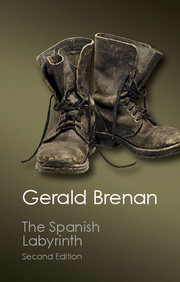Book contents
- Frontmatter
- Contents
- Foreword by Sir Raymond Carr
- Preface to the Second Edition
- Preface to the First Edition
- Chronological Table
- Political Divisions, 1873-1936. Six maps
- Part I The Ancien Régime, 1874–1931
- Part II The Condition of the Working Classes
- Chapter VI The Agrarian Question
- Chapter VII The Anarchists
- Chapter VIII The Anarcho-Syndicalists
- Chapter IX The Carlists
- Chapter X The Socialists
- Part III The Republic
- Three sketch maps
- Appendices
- Bibliography
- Index
Chapter VI - The Agrarian Question
Published online by Cambridge University Press: 05 November 2014
- Frontmatter
- Contents
- Foreword by Sir Raymond Carr
- Preface to the Second Edition
- Preface to the First Edition
- Chronological Table
- Political Divisions, 1873-1936. Six maps
- Part I The Ancien Régime, 1874–1931
- Part II The Condition of the Working Classes
- Chapter VI The Agrarian Question
- Chapter VII The Anarchists
- Chapter VIII The Anarcho-Syndicalists
- Chapter IX The Carlists
- Chapter X The Socialists
- Part III The Republic
- Three sketch maps
- Appendices
- Bibliography
- Index
Summary
It is a duty of humanity for us to open to all men the riches which God gave in common to all, since to all he gave the earth as a patrimony, so that all without distinction might live by its fruits. Only unbridled greed could claim for itself this gift of heaven, appropriating as its own the foods and riches which were intended to be the property of all… God wishes then, and it is laid down by his laws, that now that human nature, corrupted as it is, has proceeded to a partition of common goods, they should not be monopolized by a few, and that a part should always be set aside for the consolation of the people’s infirmities… In a Republic in which some are overstuffed with riches and others lack the very necessities, neither peace nor happiness is possible.
Father Juan de Mariana, De Rege et Regis Institutione, 1599.Before commencing on the history of the Republic it will be necessary to stop and give some account of the position of the peasants and working classes in Spain at this time. I shall begin with a discussion of what is really the fundamental problem in Spain – the agrarian question – and its relation to industry, and shall then in succeeding chapters trace the history of the two great working-class movements, the Anarcho-Syndicalists and the Socialists, who between them comprise the great majority of the workers in the country. Finally, I will give a brief account of the Carlists, who if not exactly a working-class movement, are to a certain extent an agrarian one.
The first thing to notice is that Spain is one of those countries with an undeveloped, primitive economy which is divided by a fairly definite line into two sections. Above are the upper and middle classes, say one-fifth of the population, who vote, read newspapers, compete for Government jobs and generally manage the affairs of the nation. Beneath are the peasants and workmen, who in ordinary times take no interest in politics, frequently do not know how to read and keep strictly to their own affairs. Between these two completely different worlds there is a gulf, imperfectly filled by the small shop-keepers and artisans.
- Type
- Chapter
- Information
- The Spanish LabyrinthAn Account of the Social and Political Background of the Spanish Civil War, pp. 141 - 213Publisher: Cambridge University PressPrint publication year: 2014



